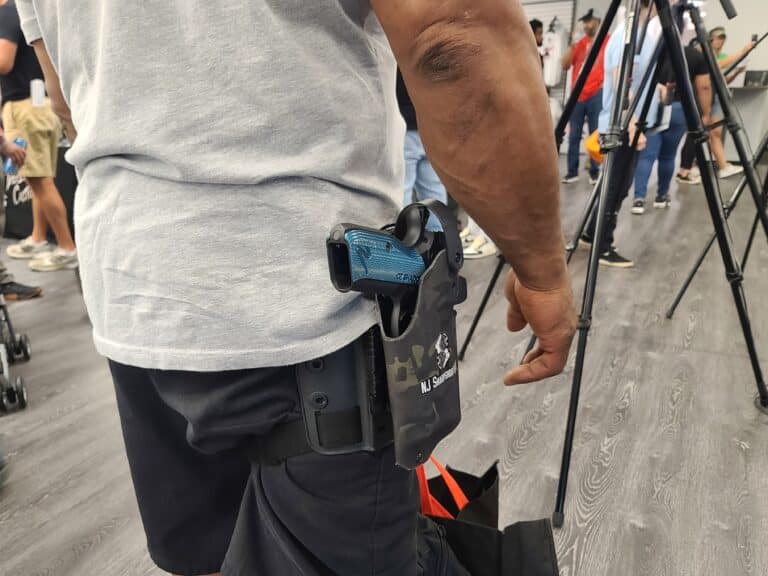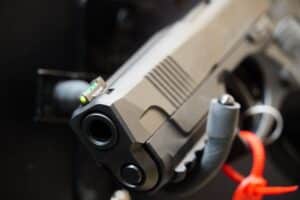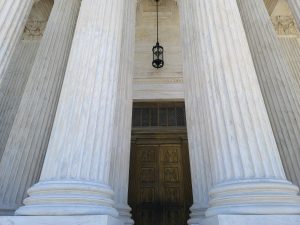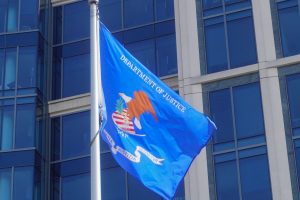The Second Circuit just became the first federal court of appeals to rule on new gun-carry restrictions in the wake of last year’s landmark Supreme Court case.
A three-judge panel delivered a unanimous, but mixed, ruling Friday. It found some of the latest restrictions imposed by New York’s Concealed Carry Improvement Act (CCIA), like the ban on carrying guns on private property open to the public, were likely unconstitutional. But it also ruled some, such as requiring permit applicants to meet a subjective “good moral character” standard, were not.
“Given that most spaces in a community that are not private homes will be composed of private property open to the public to which § 265.01-d applies, the restricted location provision
functionally creates a universal default presumption against carrying firearms in public places, seriously burdening lawful gun owners’ Second Amendment rights,” the panel wrote in an unsigned opinion in Antonyuk v. Chiumento, which consolidated several lower court cases. “That burden is entirely out of step with that imposed by the proffered analogues, which appear to have created a presumption against carriage only on private property not open to the public.”
The ruling is a setback for lawmakers who hoped to severely limit lawful gun carry even after the Supreme Court ruled carrying a gun in public was a right protected by the Second Amendment in New York State Rifle and Pistol Association v. Bruen. Most states that had their previous carry regimes struck down under the ruling, including New York itself, responded by broadly expanding what qualified as a “sensitive place” that’s off-limits for gun carry. Friday’s ruling is the first where an appeals panel has agreed these kinds of Breun-response bills have overstepped.
Beyond ruling against the ban on carrying on publicly-accessible private property, such as stores or restaurants, the panel took issue with several other CCIA provisions. It found the requirement that carry-permit applicants turn over their social media history, including unmasking any anonymous accounts they operate, unworkable.
“Social media is of course revolutionary because of the ease with which individuals can disseminate their thoughts to a large audience without the traditional barriers to publishing,” the panel wrote. “This is indeed a break from the practice of publishing newspaper pieces as ‘Publius’—we grant that Facebook likely would have baffled the Founders. But the CCIA’s social media requirement does not bear upon the aspects of social media that are new. While social media writ large may have no historical analogue, social media handles do. The frequency, formality, and barriers to dissemination of one’s views may be different, but the election of a pseudonym to hide one’s true identity is not.”
The panel also found New York’s attempt to bar lawful carry in places of worship ran into First Amendment problems. It argued the state violated the rights of plaintiff Pastor Michael Spencer and his congregation by not allowing them to decide for themselves whether guns could be carried on church property.
“[T]he CCIA is not neutral because it allows the owners of many forms of private property, including many types of retail businesses open to the public, to decide for themselves whether to allow firearms on the premises while denying the same autonomy to places of worship,” the panel wrote. “By adopting a law that applies differently as to places of worship (alongside the other enumerated sensitive places) than to most other privately owned businesses and properties, the CCIA is, on its face, neither neutral nor generally applicable.”
However, the appeals panel also upheld a number of the new gun-free zones created by the law. That could push other jurisdictions to adopt the restrictions cleared by the ruling.
Despite being a core failing of New York’s old permitting system, according to Bruen, the panel argued that the subjective “good moral character” requirement in the new law was likely not unconstitutional on its face. It argued Bruen did “not forbid discretion in licensing regimes” and said the state’s requirements were designed to root out dangerous applicants.
“[T]he requirement is not facially invalid because it is not unconstitutional in all its applications,” the panel wrote. “The CCIA’s definition of ‘character’ is a proxy for dangerousness: whether the applicant, if licensed to carry a firearm, is likely to pose a danger to himself, others, or public safety. And there is widespread consensus (notwithstanding some disputes at the margins) that restrictions which prevent dangerous individuals from wielding lethal weapons are part of the nation’s tradition of firearm regulation.”
However, it did leave open the possibility it could be unconstitutional if applied too broadly to individuals.
The panel also found numerous other gun-free zones created under the law were likely constitutional under its application of the test laid out in Bruen. It argued there were broad historical traditions for barring gun carry in parks, zoos, theaters, mental health treatment centers, or at places that serve alcohol, or during protests. Those findings undid injunctions placed by lower courts in several cases.
Both sides of the case celebrated Friday’s ruling. New York Attorney General Letitia James (D.) said it would ensure the safety of state citizens.
“Today’s decision to permit the state to enforce critical provisions of the Concealed Carry Improvement Act as the court process moves forward will help keep New Yorkers safe,” she said in a statement. “This commonsense law was enacted to keep guns out of dangerous hands and away from schools, hospitals, parks, public transportation, and other sensitive locations.”
The gun-rights groups who filed the cases that were consolidated into Friday’s ruling celebrated the panel, made up of George H. W. Bush, Barack Obama, and Joe Biden appointees, blocking several portions of the law. They argued the practical effect would be significant.
“Make no mistakes: New York wrote a law that expressly banned carrying firearms in 91% of the State,’ the Firearms Policy Coalition tweeted. “Thanks to today’s decision in our Lawsuit, that law is now unenforceable.”
Gun Owners of America described the ruling as a “rebuke” to the state’s “unconstitutional law.” But it also admitted it wasn’t a “total victory” and said it may appeal.
“It’s encouraging that the Court blocked the intrusive social media provisions, but just as intrusive are the processes needed to confirm someone is ‘of good moral character,’ which the Court has inexplicably chosen to uphold,” Sam Paredes, a board member for the sister group Gun Owners Foundation, said in a statement. “Frustratingly, much of this Court’s opinion reads like an insubordinate rebuke of the Supreme Court, which is a disgrace and cannot be allowed to stand. We are weighing action at the nation’s High Court.”
Similarly, Attorney General James vowed to keep defending the law.
“My office will continue to defend New York’s gun laws and use every tool to protect New Yorkers from senseless gun violence,” she said.
The case now returns to the lower courts for final rulings, which should be handed down in the coming weeks and months.







2 Responses
“And there is widespread consensus (notwithstanding some disputes at the margins) that restrictions which prevent dangerous individuals from wielding lethal weapons are part of the nation’s tradition of firearm regulation.”
And here we watch the court duck the central issue: WHO gets to define “dangerous”? We’ve seen Leftists who define “traditional Catholics”, parents, and “Republicans” as dangerous, along with blacks, Jews, etc.
This is not in any sense “at the margins”. It is a blanket invitation to viewpoint discrimination.
“Dangerousness” is something the Supreme Court is likely going to address in their current gun case. I’ve long thought it could be used in a nefarious way to go after disfavored groups by whoever happens to be in power.
After all, some of the analogues people use, including government lawyers, to defend current gun restrictions under the Bruen standard are bigoted bans on natives or black Americans owning guns. People were considered “dangerous” as a group based on their skin color or nationality and were therefore disarmed, at least according to that line of reasoning. Often they’ll include pre-American bans on Catholics owning guns too.
That certainly doesn’t seem like an acceptable foundation to build modern gun laws off of. But I also doubt the Supreme Court would allow that sort of bigoted reasoning to underlie its definition of dangerousness. I expect they’ll stick to convictions or at least court findings that involve the accused committing actual acts of violence.